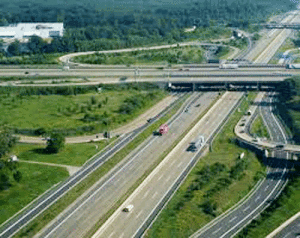- No contract has been awarded for the project yet.
- Minister for Environment Amina Mohammed has confirmed that our EIA is at an advanced stage – State Government Spokesman Christian Ita
- 20Km right-of-way puzzles all, normally it is 20 METRES
Following commencement of work without environmental impact assessment (EIA) on the 260-km modern superhighway by the Cross River State Government, controversy has swamped the project from about 60,000 indigenous peoples who are threatened by it as bulldozers are already destroying priceless forest reserves.
Cross River is host to the largest remaining rainforests of Nigeria and one of the largest bio-diversity forests in the world, serving as home to highly threatened species, including the Cross River gorilla, Nigeria-Cameroon chimpanzee, drill monkeys, 1,568 plant species of which 77 are endangered medicinal plants and orchids.
The highway, six-lane wide and 260km long is planned to lead from a yet-to-be-built Bakassi deep-sea port in Calabar, all the way to Benue State via Akamkpa and Ikom and cutting through several protected forest reserves and abutting the western boundary of the Cross River National Park – the Oban Division.
Raising alarm, an international green foundation, Heinrich Boll Stiftung Nigeria warns that the bulldozers moving against public opinion, will cut through five forest reserves and a mountain wildlife with serious ramifications for the bio-diversity of the forests and the socio-economic lives of 60,000 indigenous peoples living within and around the forests, including natives of Akpabuyo, Bakassi, Akamkpa, Yakurr, Obubra, Etung, Ikom, Boki and Bekwara local government areas.
Already, the bulldozers have entered the Ekuri-Eyeyeng, Etara and Okuni areas; clearing and felling trees. Yet up till mid-March 2016, there was no Environmental Impact Assessment as mandated by the Nigerian Constitution before the commencement of a project of such magnitude.
The super highway, which is 260km long, will have a 10km right-of-way on both sides of the highway, meaning that a total of 20km-wide land corridor along the superhighway route falls under the land being revoked by the state government.
This also means that the over 185 communities within the affected land corridor are subject to displacement and sudden loss of access to their land.
A chilling timeline
A factsheet released by Heinrich Boll exposes a chilling timeline. Shortly after he was sworn in as governor of Cross River State in May 2015, Benedict Ayade outdoored the plan to construct a superhighway as well as a deep seaport in pristine mangroves.
In September, 2015, a groundbreaking ceremony and visit by President Muhammadu Buhari was postponed because of the non-existence of Environmental Impact Assessment (EIA). Within this period, there was a re-routing of the highway to move it outside the National Park.
On January 22, 2016, the state government in a notice published in its newspaper, Weekend Chronicle, announced the revocation of all occupancy titles within a 20-kilometre wide corridor of land along the 260-kilometre route.
The state revoked the rights of occupancy within the 20-kilometre–belt, which cuts through protected forests areas within and outside the National Park, including Cross River South, Oban Group, Ukpon River and Afi River Forest Reserves; Afi Mountain Wildlife Sanctuary, plus the Mangrove Reserve, where the government has revoked land titles, giving it the right to fall trees, clear farms or displace communities.
The factsheet showed that in comparison, other expressways of similar sizes in Nigeria have revoked such rights of occupancy but only within a 100 metres (0.1 kilometre) strip, not 20 kilometres. Federal highways are built to standards of the Federal Highways Act of 1971 with a total road right-of-way extending to 50 metres on each side of the centerline.
In February, 2016, bulldozers moved into the Ekuri-Eyeyeng, Etara and Okuni areas, clearing and falling trees. In protest, communities in Old and New Ekuri prevented bulldozers from logging in their forest. Government reacted by sending more bulldozers into Katchuan, Irruan, Borum, Boje, Iso Bendeghe and Nsadop in Boki.
The Superhighway has triggered a public debate as to whether or not the Cross River State Government should be embarking on such a project in the first place. There are already two federal highways connecting Calabar to Benue.
Constructed about 40 years ago, these are in need of expansion and rehabilitation in many places, yet they serve the majority of towns and villages in the state.
Environmentalists argue that these two existing highways can serve the same economic purpose as the superhighway. In their opinion, the state could have instead refurbished and expanded the federal roads and later make claims to the Federal Government, as did Rivers and Lagos States.
Zero due process
What some critics find more disturbing is the haste the Cross River government has applied to the project from the onset, arguing that this haste may have negatively impacted the quality of thought driving the Superhighway.
The Heinrich Boll factsheet states: “The Nigerian Environmental Impact Assessment Act of 1992 mandates federal, state and local governments and private companies to carry out a detailed EIA on environmentally threatening projects. There is no public record of an EIA being initiated for the superhighway.
“There has been no public notice to access the document as required by Section 24, EIA Act 1992. In other countries, a professional Environmental Social Impact Assessment (ESIA) for road construction projects of this magnitude would require four to five years to complete.
“State Procurement Law No 15(2011) requires a bidding process for this kind of project, but none was carried out. Neither did the State Bureau of Public Procurements in accordance to Section 9 (h) embark on a review and evaluation.”
Moreover, due process at state level would have required the submission and publication of an engineering plan or blueprint for the superhighway before forest clearing commenced.
According to the notice of revocation of rights of occupancy published by the state government, bullet point 4 reads: “And notice is hereby given that government intends to enter and use the said land at the expiration of six (6) weeks from the date of this notice”.
Having published the notice January 22, 2016, Heinrich Boll said, no work should have commenced before March 4, but that clearing of the forest began in February.
In his reaction to the Superhighway controversy, Christian Ita, the Chief Press Secretary to Governor Ayade confirmed that bulldozers were indeed clearing forests, adding that the clearing will soon be stopped because no contract has been signed for the Superhighway.
Ita told PREMIUM TIMES that ongoing works were being carried out by a state-owned company called INFRACROSS, a special purpose vehicle which is responsible for such infrastructure development in the state.
“There is a lot of illiteracy about this project. No contract has been awarded. There is an EIA, but that EIA is just for the groundbreaking. The Minister for Environment, Amina Mohammed, came to Cross River and confirmed that our EIA is at an advanced stage,” Ita said.
Asked to comment on the lack of due process, Ita added:
“The truth of the matter is that some NGOs have been paid to ridicule and kill this project. Let’s not play politics with development please. Is it that we don’t need infrastructure?
“The forest you are protecting, who owns the forest? The forest is ours. But we are not insensitive. For every tree destroyed, two more will be planted. And for people living in those areas, government is conducting enumeration to know who is affected.”
President Buhari performed the groundbreaking ceremony for the project on October 20, 2015, expressing the hope that the road would create a new vista of business opportunities for Cross River and the nation at large.
He commended Governor Ayade for his vision and foresight in conceptualising the project.
-PremiumTimes













